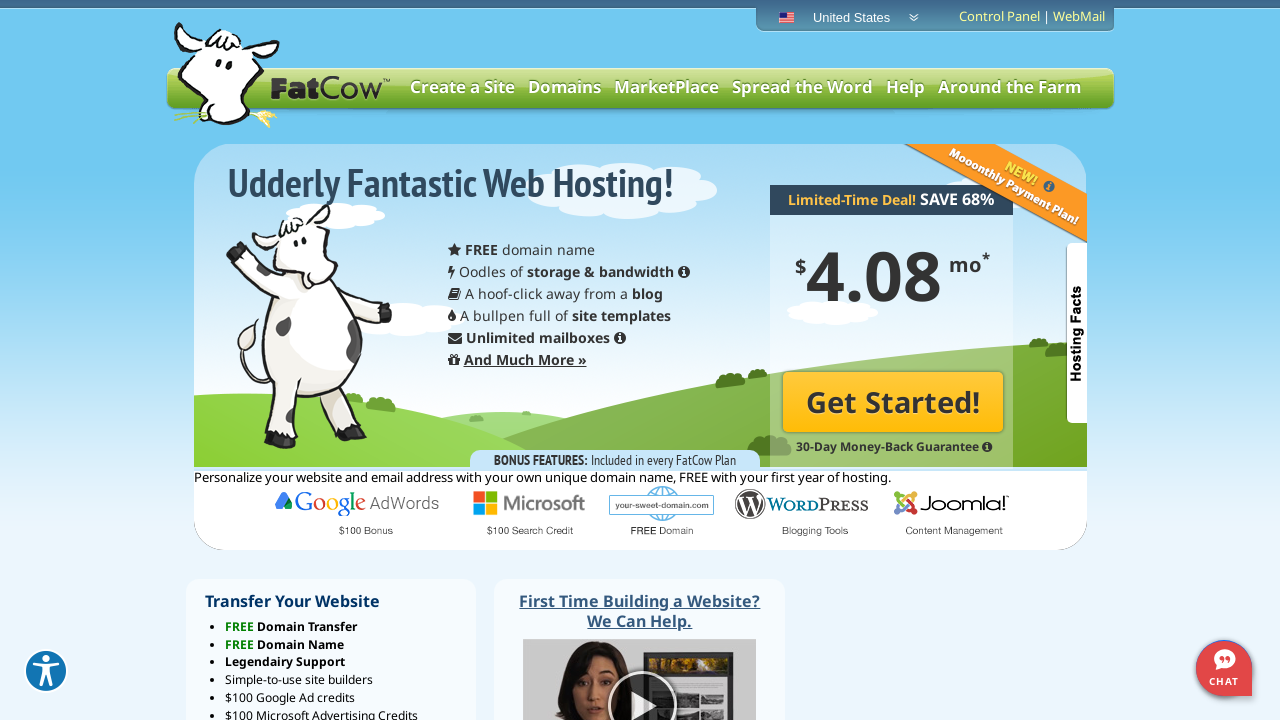FatCow Hosting Review, An Honest and In-Depth Look
FatCow is a web hosting company that has been around since 1998, known for its quirky branding and simple, affordable hosting plans.
In this review, we’ll dive into the services offered by FatCow, how they compare to other hosting providers, and whether they are a good choice for your hosting needs.
FatCow primarily offers shared hosting services, but they also provide domain registration, VPS hosting, and dedicated server hosting. Here’s a closer look at each of these services.
Shared Hosting
FatCow’s most prominent product is its shared hosting plan, often marketed as the “Original FatCow Plan.” This plan includes:
Unlimited Disk Space: Offers ample storage for most small to medium-sized websites.
Unlimited Bandwidth: Promises unmetered traffic, though the fine print suggests “unlimited” applies within normal usage limits.
Unlimited Domains: You can host multiple websites under one account.
Free Domain: FatCow provides a free domain name for the first year.
Free Email Accounts: Unlimited email addresses are provided with your domain.
Website Builder: Comes with a drag-and-drop website builder, making it easier for beginners to create their website.
cPanel Alternative: FatCow uses vDeck, a control panel that’s less common but functional for managing files, databases, and email.
VPS Hosting
FatCow offers three tiers of VPS hosting, Basic, Business, and Optimum. These plans include:
Customizable RAM and Storage: You can choose from different levels of resources to match your needs.
Root Access: Provides control over the server environment.
Instant Provisioning: Quick deployment after purchasing the plan.
Dedicated Hosting
FatCow’s dedicated hosting offers four main packages—Startup, Professional, Enterprise, and Hosting Custom:
High Performance: Dedicated servers provide optimal speed and performance for larger websites or businesses.
Full Control: Users have complete control of their server environment, making it ideal for technical users.
Scalability: Options to scale your resources based on traffic and performance demands.
Domain Registration
FatCow also provides domain registration services, along with various add-ons like domain privacy protection.
Email Hosting
Email services are bundled into their hosting plans. These include unlimited email addresses, access to webmail, and support for third-party email clients.
FatCow’s Strengths 💪
Affordable Pricing: FatCow is known for its competitive pricing, especially for beginners. The shared hosting plan is typically lower than most industry standards, making it attractive for individuals or small businesses.
Simple to Use: The user-friendly interface and website builder cater to non-technical users. Their vDeck control panel, while different from cPanel, is still easy to navigate.
Unlimited Features: Offering unlimited domains, storage, and bandwidth (within typical usage) makes it appealing for those planning to host multiple sites.
Eco-Friendly Hosting: FatCow is a certified green host, meaning it offsets its energy use by purchasing wind energy credits. This is a bonus for environmentally-conscious businesses.
FatCow’s Weaknesses 👎
Performance and Uptime: While FatCow claims to provide “unlimited” resources, many users report issues with slow loading speeds and downtime during high-traffic periods. FatCow doesn’t offer an uptime guarantee like many competitors, which can be a drawback for businesses relying on website availability.
Customer Support: FatCow provides 24/7 customer support via phone, email, and chat, but reviews are mixed. Some customers report long response times and inadequate resolutions to their issues.
vDeck Over cPanel: Many users are accustomed to cPanel, the most popular control panel in the hosting industry. FatCow’s use of vDeck can be a bit of a learning curve, and it’s not as feature-rich as cPanel.
How FatCow Compares to Other Hosting Providers
Versus Bluehost
Performance: Bluehost, another budget hosting provider, generally offers better performance and faster loading times. They also boast an uptime guarantee (99.99%) compared to FatCow, which doesn’t provide one.
Ease of Use: Both providers are beginner-friendly, but Bluehost’s use of cPanel makes it more familiar for many users, while FatCow’s vDeck feels a bit outdated.
Support: Bluehost is known for its superior customer support, with faster response times and more knowledgeable staff.
Versus HostGator
Pricing: FatCow has an edge in initial pricing, as HostGator’s plans tend to increase more drastically after the initial term.
Scalability: HostGator offers better scalability options, especially with their cloud hosting plans, whereas FatCow’s offerings feel more limited.
Uptime and Speed: HostGator tends to outperform FatCow in uptime and speed, with HostGator offering a 99.9% uptime guarantee.
Versus SiteGround
Performance: SiteGround excels in performance, offering faster loading times and a better overall hosting experience. It also provides advanced security features.
Customer Support: SiteGround is widely regarded as having some of the best customer support in the industry, far surpassing FatCow in this regard.
Price: While SiteGround is more expensive, especially after the introductory period, the added performance and support may justify the cost for users looking for premium hosting services.
Versus DreamHost
Features: Both DreamHost and FatCow offer unlimited features on their shared hosting plans, but DreamHost has the advantage of including free automated backups and SSD storage, which can significantly boost performance.
Ease of Use: DreamHost also uses a proprietary control panel, which some users find less intuitive than cPanel but still offers more flexibility than FatCow’s vDeck.
Final Verdict: Is FatCow Hosting Worth It? ⚖️
FatCow is a decent option for beginners, especially for those on a tight budget who need a simple hosting solution for small websites or blogs. The quirky branding and eco-friendly approach are appealing, but performance and reliability issues may turn away users who need more robust hosting services.
For those looking for an affordable way to get online with minimal technical know-how, FatCow’s shared hosting can be a good starting point. However, if performance, uptime, and scalability are top priorities, there are better alternatives like Bluehost, SiteGround, or DreamHost, which offer more reliable services at a comparable price point.
Ultimately, FatCow is best suited for hobbyists or small businesses with light hosting needs, but for growing businesses or high-traffic websites, it’s worth considering other hosts that provide better performance and customer support.
For more information, visit FatCow.
